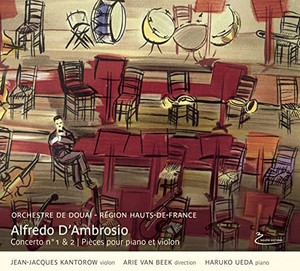
Alfredo d’Ambrosio (1871-1914)
Violin Concerto No.1 in B minor, Op.29 (1903)
Violin Concerto No.2 in G minor, Op.51 (1912)
Deuxième Canzonetta in G major, Op.28 (1904)
Romance in D major, Op.9 (1899)
Introduction et Humoresque in A major, Op.25 (1904)
Sérénade in D major, Op.4 (1897)
Canzonetta, Op.6 (1898)
Jean-Jacques Kantorow (violin)
Orchestre de Douai – Région Haut-de-France/Arie van Beek
Haruko Ueda (piano)
rec. 2021/22, l’auditorium Henri Dutilleux, Douai; Studio Soupir Éditions à Orvilliers
Soupir Éditions S256 [70]
It’s good that interest in the music of Alfredo d’Ambrosio has been increasing in recent years. Back in 2019 I reviewed DVD performances of the two concertos, the first played by Laura Bortolotto and the second by Christian Sebastianutto, whilst there’s also a 2022 DVD of smaller pieces dedicated to d’Ambrosio’s eminent contemporaries (review). More recently still, Brilliant brought out a 3-CD set of all d’Ambrosio’s smaller pieces (review) played by the Gran Duo Italiano, Mauro Tortorelli (violin) and Angela Meluso (piano).
This latest release conjoins both concertos with a handful of salon pieces, on CD this time, played by Jean-Jacques Kantorow, better known these days as a conductor but who was well-known as a soloist and chamber player in days gone by. He retains his finesse and phrasal elegance as well as a somewhat small-scaled approach to the concerto repertoire and with his silvery tone he brings his own personal qualities to bear. What he doesn’t bring is the kind of arresting romantic coloration, expressive commitment and grandeur that the great Aldo Ferraresi did, in the Concerto No.1, a performance of which can be found in a Rhine Classics box (review). Very imperfectly recorded though it is – on a portable cassette from memory – it shows us the bravura allure a great soloist can bring to this work – songful, romantic and red-blooded. Kantorow plays with sincerity and clarity but he doesn’t bring the concerto to life and his lack of expression is rather graphically shown in the slow movement, where his directness shows his limits – affectionately phrased but lacking romanticist élan, the kind of thing that Ferraresi possesses in profusion. Just sample the Italian’s slashing, swashbuckling playing in the finale and you’ll hear what I mean. I have to note as well that in her live performance Bortolotto offers much more than Kantorow in the way of phrasal and expressive commitment. Finally, Soupir’s recording is rather one-dimensional and the percussion thuds oddly: at several points it sounded to me more like banging from next door.
The Second Concerto, completed in 1912, was dedicated to Jacques Thibaud but premiered by Enescu in 1913 with the composer conducting. It has a specified timing of between 30 and 35 minutes which should give a soloist latitude. In his DVD performance Christian Sebastianutto took 33 minutes. Kantorow and conductor Arie van Beek take 29, on the fleet side but not unconscionably so. Once again Kantorow plays with facility and precision, and the orchestra follows suit but there’s something unidirectional about the passagework and thematically Kantorow can’t bring much that’s memorable to the music. Arguably the first movement could have been taken a touch slower – it’s Allegro moderato, after all. In short, Kantorow is a deft but rather neutral soloist; the slow movement passes without much trace and whilst the finale’s B section is warmly done, the rest is a touch effortful.
Though this may sound damning of Kantorow it’s not meant to be. I simply think he has been miscast as a romantic soloist. That’s reinforced by the small pieces, some of d’Ambrosio’s most famous, where he shows a refined, occasionally reserved charm without much inflexion.
Given the foregoing, I can’t really summon up a huge amount of enthusiasm for this disc, for all the dedication that has gone toward its making. The notes are good, the recording, as noted, somewhat faceless and the performances tend to sit on the page.
Jonathan Woolf
Availability: Amazon France


















